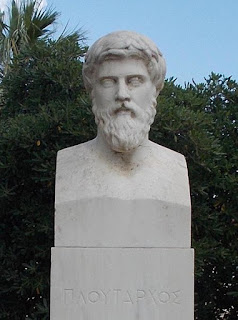 |
| Plutarch's bust at Chaeronea, his home town |
Plutarch was a prolific writer, and his many biographical works included Parallel Lives, about Greeks and Romans. His Moral Essays covered a wide variety of themes, such as greed, flattery, loquacity, superstition, education, and marriage; his style was popular, being both lively and instructive. In other essays a more ambitious approach appeared, in that themes were tackled that interested Stoics, Epicureans, and Platonists. As an avowed Platonist, Plutarch was in some ways open to Stoic influence; for example, in his emphasis on Providence.
His intense interest in religious beliefs and practices in addition to his vast reading on the whole field have led to the considered claim by Jean Hani (1976) that Plutarch is antiquity's best historian of religions. The claim is strongly supported by Plutarch's superb treatise On Isis and Osiris (the De Iside et Osiride—although written in Greek, the Moral Essays are traditionally called by their Latin titles). In this work, a distinction should be made between the accounts given of myths and rites and the often added interpretations. The accounts showed, on the whole, a remarkable reliability when compared with the evidence of the Egyptian sources; the interpretations, in contrast, were often colored by Pythagorean, Platonic, Stoic, Gnostic, and even Iranian ideas; in chapters 46, 47, and 48 the dualistic basis of Zoroastrianism was presented in an expose, which has often been quoted as authoritative.
For evidence on the contemporary cult of the Egyptian deities, Plutarch relied to some extent on his friend Clea, who held a double priesthood at Delphi—that of Isis and that of Dionysus. His book is dedicated to Clea. (It is possible, though not certain, that Plutarch was also an initiated devotee of Isis.) On a wide range of information about Egyptian religion, Plutarch was greatly indebted to a large number of Greek writers, whose compilations he probably used. Their quality varied, but most important among them to Plutarch was Manetho, a bilingual Egyptian and a high priest at Heliopolis under the first two kings of the Ptolemaic dynasty.
Recent Pages:
· Sir William Matthew Flinders Petrie
· Petuabastis
· Philae
· Piety in Ancient Egypt
· Piramesse
· Tell el-Maskhuta (Pithom)
· Second Intermediate Period
· Piya (744–714 BC)
